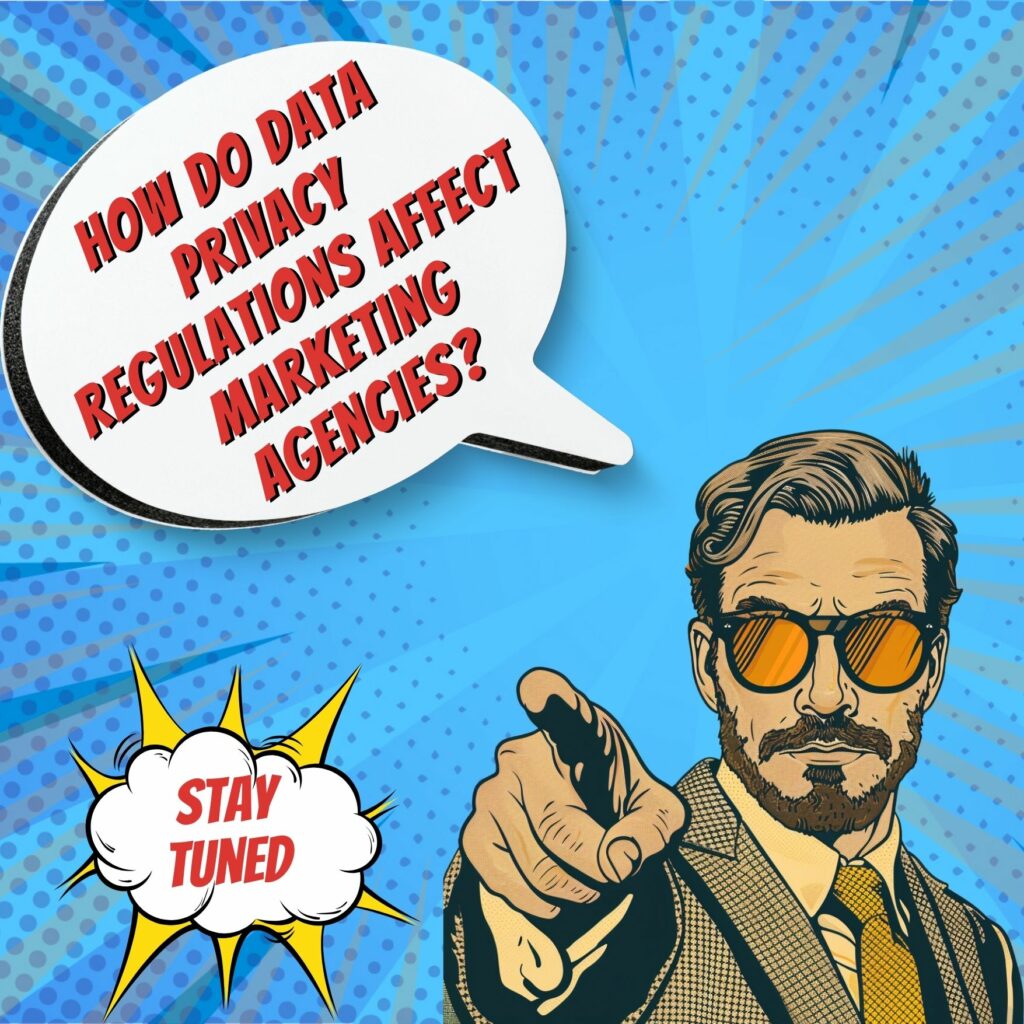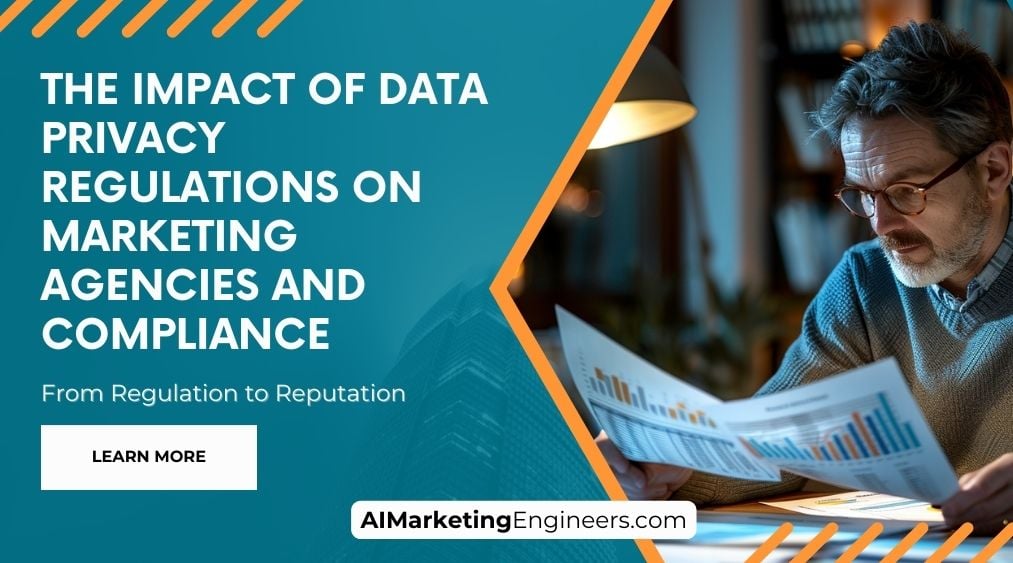Key Takeaways
✅ Understanding and Adapting to Diverse Regulations: Marketing agencies must navigate various data privacy laws like GDPR and CCPA, which require explicit consent for data use and robust security measures. Staying informed and adapting practices is essential to avoid legal and reputational damage.
✅ Implementing Best Practices for Compliance: Agencies should educate themselves on data privacy laws, secure explicit consent, implement strong data security, and keep their privacy policies up to date. Partnering with reputable service providers can also ensure compliance and efficiency.
✅ Managing Risk and Liability: Non-compliance can lead to heavy penalties and loss of client trust. Agencies need to implement strict data security measures and offer guarantees in client agreements to manage the risk effectively.

Introduction
How do data privacy regulations impact marketing agencies, and what steps can they take to stay compliant? The rise of laws such as the GDPR in Europe and the CCPA in the US has transformed the marketing landscape. These regulations aim to protect consumer privacy and ensure responsible data handling. The stakes are high: non-compliance can result in severe financial penalties and reputational damage. This article explores these challenges and offers innovative strategies to help agencies navigate this complex environment, ensuring compliance while maximizing their ROI. Uncover actionable insights and groundbreaking information on how to turn regulatory challenges into opportunities for growth.
Top Statistics on Data Privacy Regulations
Top Statistics
| Statistic | Insight |
|---|---|
| 75% of the global population will have their personal data covered under privacy regulations by the end of 2024. | This underscores the growing global emphasis on data protection and the increasing need for businesses to comply with diverse regulations. |
| 94% of organizations agree that customers won’t buy from them if they don’t believe personal data is properly secured. | Trust in data security is crucial for consumer relationships, highlighting the need for transparency and robust security measures. |
| 95% of organizations say the benefits of investing in data privacy exceed costs, with the average organization realizing a 1.6x return on their privacy investment. | Companies are beginning to see data privacy as an investment that not only complies with regulations but also has a significant return, emphasizing its financial benefits. |
| 87% of people favor outlawing the sale of user data to third parties without permission. | This statistic emphasizes the public's demand for stricter data handling and the importance of obtaining explicit user consent. |
| The highest GDPR fine to date was $1.2 billion, announced in May 2023. | The substantial fines under GDPR show the serious financial risks of non-compliance, incentivizing stricter adherence to data protection laws. |
Understanding Data Privacy Regulations
Data privacy regulations have emerged as a significant aspect of digital marketing, with various laws dictating the collection, processing, and protection of consumer information. The General Data Protection Regulation (GDPR) in Europe and the California Consumer Privacy Act (CCPA) in the United States are key examples of such regulations. Their primary aim is to protect consumer privacy and ensure businesses handle personal data responsibly. How well are companies adapting to these stringent requirements? These regulations require companies to implement comprehensive data protection policies and procedures. They also mandate regular audits and assessments to ensure compliance. For marketing agencies, staying updated on global data privacy trends is essential to maintain compliance across different regions.
Essential Compliance Requirements
To comply with data privacy regulations, marketing agencies must take several important steps. They need to obtain explicit consent for collecting and processing data, ensuring consumers are fully informed. Transparent privacy policies that clearly explain data usage are essential. Robust security measures must be in place to prevent unauthorized access. Can consumers easily access, correct, or delete their data? They should be able to, as these regulations mandate it. Additionally, privacy policies should be regularly updated to reflect changes in legislation and consumer behavior. Agencies should also conduct regular training sessions for employees to keep them informed about compliance requirements. Establishing a dedicated data protection officer can further enhance compliance efforts.
Impact on Marketing Agencies
The increasing complexity of these regulations has substantial implications for marketing agencies. Understanding and complying with multiple regulations can be both time-consuming and costly. Clients are now demanding stricter data security and liability clauses, posing challenges especially for smaller agencies. The risks of non-compliance are severe: significant financial penalties, legal challenges, and reputational damage. Are smaller agencies equipped to meet these stringent demands, or are they at a distinct disadvantage? Larger agencies may have the resources to invest in comprehensive compliance programs, but smaller agencies must find cost-effective solutions. Collaboration with legal experts and compliance consultants can be beneficial. The evolving regulatory landscape requires continuous adaptation and vigilance.
Best Practices for Staying Compliant
Marketing agencies can navigate these regulations more effectively by adopting several best practices. First, staying educated and updated on relevant regulations is crucial. Implementing robust data security measures and access controls can mitigate risks. Partnering with trusted service providers ensures ongoing compliance. Regular reviews and updates of privacy policies are necessary to maintain clarity and transparency. Is your agency ready to adopt these best practices to ensure seamless compliance? Establishing a clear data governance framework can help manage data more efficiently. Regularly conducting risk assessments can identify potential vulnerabilities. Engaging in continuous dialogue with clients about data privacy practices can also foster trust and transparency.
Consequences of Ignoring Regulations
Failing to adhere to data privacy regulations can bring about severe repercussions. Agencies face financial penalties and potential legal challenges. The damage to an agency’s reputation can lead to a loss of client trust and, consequently, business. Furthermore, the risk of data breaches increases significantly, bringing about further financial and reputational damage. Are agencies preparing adequately to avoid these consequences, or is non-compliance a ticking time bomb? Regulatory bodies are becoming increasingly stringent in their enforcement, leaving no room for negligence. Proactive measures and continuous monitoring are essential to avoid lapses in compliance. Investing in robust compliance frameworks now can prevent costly consequences later.
The Evolving Landscape of Data Privacy
As data privacy regulations evolve, marketing agencies must adapt and prioritize compliance to maintain trust with clients and consumers. Embracing new technologies and strategies that support data privacy and security will be vital. These may include cookieless tracking and enhanced data encryption. Are marketing agencies ready to embrace these innovations to stay ahead in the ever-changing landscape of data privacy? Staying ahead of regulatory changes requires a proactive and agile approach. Agencies must invest in ongoing education and training for their teams. Collaborating with technology providers who specialize in data privacy solutions can also ensure agencies remain compliant and competitive.
AI Marketing Engineers Recommendation
Recommendation 1: Adapt Marketing Strategies to Data Privacy Regulations through Transparent Data Practices: Adapting your strategies to comply with data privacy regulations is not just about avoiding penalties. It also builds trust with your audience. Consider this: according to a survey by Cisco, 84% of customers care about data privacy, and 48% have already switched companies due to their data policies. Begin by being transparent. Clearly inform customers what data you collect, how you use it, and secure consent before any data gathering. This small adjustment in strategy can result in increased customer loyalty and a stronger brand reputation.
Recommendation 2: Invest in Advanced Data Privacy Compliance Tools to Secure Marketing Campaigns: Staying ahead in today's regulatory landscape means actively managing data privacy compliance. Recent studies, such as the one by DAPR, indicate that businesses investing in compliance tools have seen a 25% reduction in costs associated with data breaches. Tools like OneTrust or TrustArc can automate and ensure your marketing campaigns are compliant. Not only do these tools help in avoiding hefty fines, but they also mitigate risks, ensuring your campaigns run smoothly without legal hiccups.
Recommendation 3: Leverage Encrypted and Secure Data Management Systems for Customer Data: The importance of secure data management systems cannot be emphasized enough. As per a 2022 report by Statista, companies acknowledging robust data security practices have experienced a 20% increase in customer trust. Implement end-to-end encryption for your data storage and transfers. Tools such as Microsoft Azure and AWS provide robust, scalable solutions that safeguard against breaches. This practice not only aligns with data privacy regulations but also underscores your commitment to protecting customer information, enhancing credibility and confidence in your brand.
Relevant Links
- Unlocking the Secrets to Successful Data Privacy Compliance
- Maximizing ROI: Ad Monitoring and Performance Tracking
- Boosting E-commerce Success with Responsible Data Management
- Advanced Analytics in Marketing: Enhancing Conversion Tracking and Sales Attribution
Conclusion
Ensuring compliance with data privacy regulations requires marketing agencies to adopt a proactive and thorough approach. This involves regularly reviewing and updating data handling practices, investing in advanced security technologies, and training staff on data protection protocols. By prioritizing these efforts, agencies can mitigate risks and build a culture of trust and transparency.
Furthermore, compliance with data privacy laws can be leveraged as a competitive advantage. Agencies that demonstrate a strong commitment to protecting consumer data can differentiate themselves in the market, attracting clients who value data security. This proactive stance not only enhances reputation but also fosters long-term client relationships based on trust.
The impact of data privacy regulations on marketing agencies is profound, shaping how they operate and interact with consumer data. By embracing compliance as an integral part of their strategy, agencies can navigate regulatory challenges, protect their reputation, and achieve sustainable growth. Staying informed and adaptable in the face of evolving regulations will be key to maintaining success in the dynamic landscape of data privacy.
FAQs
Question 1: What is data privacy?
Answer: Data privacy refers to the laws and regulations that govern the collection, handling, and use of personal information by organizations. It involves protecting consumer data and ensuring that individuals have control over their information.
Question 2: What is the difference between data privacy and data security?
Answer: Data privacy focuses on the rights of individuals to control their personal information and the legal requirements for handling that data. Data security, on the other hand, involves the technical measures taken to protect data from unauthorized access or breaches.
Question 3: What are the key data privacy regulations?
Answer: Major regulations include the General Data Protection Regulation (GDPR) in the European Union, the California Consumer Privacy Act (CCPA) in California, and other state-specific regulations in the United States.
Question 4: How do data privacy regulations impact marketing agencies?
Answer: Marketing agencies must comply with data privacy regulations when collecting, processing, and using consumer data. This includes obtaining consent, providing transparency, and ensuring data security measures are in place.
Question 5: What are the consequences of non-compliance with data privacy regulations?
Answer: Non-compliance can result in significant financial penalties, legal challenges, damage to reputation, and loss of client trust.
Question 6: How do marketing agencies ensure compliance with data privacy regulations?
Answer: Compliance involves educating staff on regulations, obtaining explicit consent, implementing robust security measures, staying updated on legal changes, and partnering with trusted providers.
Question 7: What steps can marketers take to comply with data privacy regulations?
Answer: Marketers should regularly update privacy policies, control customer data visibility, and ensure that data is only accessible to authorized personnel.
Question 8: How can marketing agencies balance data collection with data privacy?
Answer: Agencies should collect only necessary data, provide transparent privacy policies, and ensure that data is securely stored and protected.
Question 9: What role do clients play in ensuring data privacy compliance?
Answer: Clients often require agencies to take on the risk of data privacy violations, so agencies must ensure compliance to maintain client trust and avoid legal repercussions.
Academic References
- Beldad, A., et al. (2019). Analyzing Privacy Policies on Dutch Municipal Websites. Government Information Quarterly, 36(3), 450-459. This study scrutinized privacy policies on Dutch municipal websites, revealing that not all websites had privacy policies, and that the quality varied greatly. It calls attention to the urgent need for clear and accessible privacy policies to ensure compliance with data protection laws.
- Dias, B., et al. (2019). Examining Privacy Policies on Portuguese Municipal Websites. Journal of Information Privacy and Security, 15(1), 1-16. This research surveyed privacy policies on Portuguese municipal websites, aiming to increase awareness among local authorities. It underscores the importance of effective privacy policies in ensuring compliance with data protection regulations.
- Reddick, C. G., & Zheng, Y. (2019). Privacy Protection on Chinese City Government Websites. Social Science Computer Review, 37(4), 511-525. This study assessed the privacy protection of Chinese city government websites, revealing their poor performance in privacy statements. It highlights the need for robust privacy policies and practices in government agencies.
- Javed, H., et al. (2020). Website Privacy Policies in South Asian Economies. Information Systems Management, 37(3), 200-212. This research evaluated website privacy policies in South Asian economies, finding low levels of accessibility, readability, and compliance with privacy principles. It stresses the need for improved privacy policies and practices in the region.
- Mohan, R., et al. (2020). GDPR Compliance in Large-Scale Cloud Services. Computer Law & Security Review, 36(4), 105405. This study discovered that many large-scale cloud services claiming GDPR compliance had unclear and potentially non-compliant privacy policies. It emphasizes the necessity for clear and compliant privacy policies in cloud services.











